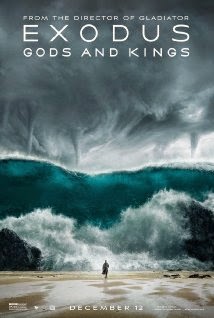Exodus: Gods and Kings
Exodus: Gods and Kings
Starring Christian Bale, Joel Edgerton, Ben Kingsley, Aaron Paul
Directed by Ridley Scott
For 400 years, the Hebrew people have been held in slavery to the Egyptians, building their pyramids and statues. Moses (Christian Bale) is a member of the royal family of Egypt and a general in the army. After a meeting with the Hebrew elder Nun (Ben Kingsley), Moses learns that he is also a Hebrew who was rescued during the time where all firstborn Hebrew children were sentenced to death and raised in Pharaoh's home.
After killing an Egyptian guard, he returns home and the Pharaoh dies, where Ramses (Joel Edgerton) takes on the role of the next Pharaoh. He banishes Moses for revealing that he is a Hebrew and Moses wanders the countryside, falls in love with Zipporah, and has a son. Nine years later, he encounters God as a child and is told to be a savior to the Hebrew people, so he sets out to free them from the bondage of slavery.
Review:
I've never been one to scold a movie for varying from its original book source, but I did with "Noah" because it was undoubtedly the worst adaptation ever, but at least Darren Aronofsky wanted it that way. With "Exodus," it seemed director Ridley Scott wanted to re-create his classic "Gladiator" and totally disregard the real source material.
Moses is seen as a capable leader, a mighty warrior, and someone who trains the Hebrews in the art of warfare, much like Maximus did in "Gladiator." None of this is found in the Bible, as Moses is seen as a man who stuttered, and was never known for carrying a sword, but rather a staff.
When it came time for the ten plagues to hit Egypt, it wasn't moreso an act of God but rather seen as an act of nature. Instead of Moses turning the Nile to blood, it's a group of alligators who murder a team of fisherman and then eating themselves that led to the Nile turning to blood. This caused the frogs to leave the waters and invade the land, resulting in their death due to lack of water, which brought the gnats, which then came the boils, and each subsequent plague was something that was caused by the previous, rather than God doing it miraculously.
The death of the firstborn son was something that drove Pharaoh to finally let the Hebrew people go, and for the film it was done very closely to the Bible, as Moses instructed the Hebrew people to kill a lamb and paint their doorposts with its blood, so God would pass over their houses, much like it was done in the book of Exodus. When the death occurs, Moses hears the cries of the Egyptian people, which was depicted as the loudest wails ever heard in the country.
So Pharaoh lets God's people go, and then decides he wants them dead, so he chases after them. Instead of God leading Moses and his people out, it's Moses who makes the decisions on where to go, and it seems God has left them.
When they reach the Red Sea, it's incredibly shallow and easy to cross, where in the Bible Moses struck the ground with his staff, parting the waters. As Pharaoh's army advances, a huge storm occurs and a wall of water comes rushing at them, which is an extreme departure from what really happened. Instead of God's providing hand helping the Hebrew people, this wall of water came rushing at them all, threatening to kill both Egyptian and Hebrew alike. In its most absurd scene, the waters swallow up Moses and Pharaoh, and both men survive by swimming to other ends of the sea. It was a laughable scene because neither man could possibly have survived such a deluge.
While the visuals were stunning and everything you'd expect from a Ridley Scott epic, the story is extremely flat and there is no real characterization to be mentioned. Moses is seen as someone who continually rebels against God and tries doing things on his own, and instead of God being the one to free his people, it's a series of random disasters that causes Pharaoh to let the people go. Major Biblical characters (such as Joshua, Aaron, and Miriam) are reduced to secondary characters who serve little to no purpose, and even the main event (the parting of the sea) is lackluster at best.
Summary:
The Bible has such a wealth of storytelling that it itself could be one major production, but once again Hollywood muddied it down and turned it into something less than what it could be.
My Rating: B+




Comments
Post a Comment